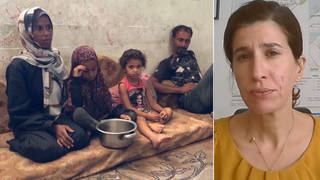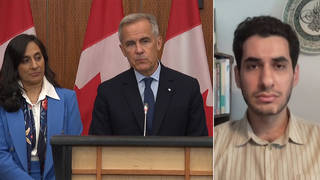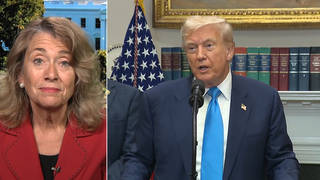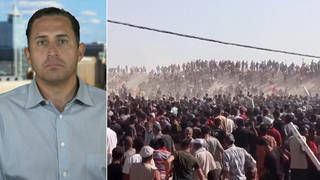
Guests
- Cornel Westphilosopher, author, critic, actor, civil rights activist and Dietrich Bonhoeffer professor of philosophy and Christian practice at Union Theological Seminary.
Cornel West, the iconic academic and social critic, has declared his candidacy for president of the United States in the 2024 election. He is running with the People’s Party, a progressive alternative to the two major parties that grew out of Bernie Sanders’s 2016 campaign. With 2024 shaping up to be a rematch between “neofascist” Donald Trump and “milquetoast neoliberal” Joe Biden, West says voters need a real alternative focused on tackling inequality, racism, war and corporate greed. “There’s an indifference to the plight of the vulnerable,” West tells Democracy Now! He also discusses the war in Ukraine, censorhip, right-wing extremism, and allegations of sexual harassment and assault against People’s Party founder Nick Brana, among other topics.
Transcript
AMY GOODMAN: This is Democracy Now!, democracynow.org, The War and Peace Report. I’m Amy Goodman.
Well, the 2024 presidential race is becoming more crowded. Former New Jersey Governor Chris Christie and former Vice President Mike Pence have both joined the Republican race.
Meanwhile, the philosophy professor and civil rights activist Cornel West has announced he’s running for president as a candidate with the People’s Party. In a short video released Monday, Dr. West criticized both the Democratic and Republican parties.
CORNEL WEST: We’re not talking about hating anybody. We’re talking about loving. We’re talking about affirming. We’re talking about empowering those who have been pushed to the margins. Because neither political party wants to tell the truth about Wall Street, about Ukraine, about the Pentagon, about Big Tech.
AMY GOODMAN: West’s announcement surprised many political observers. In 2008, he endorsed Barack Obama, but later became a vocal critic of the Obama-Biden administration. In 2016 and 2020, he backed Bernie Sanders in the Democratic primaries.
Cornel West is now running as a member of the People’s Party, which was founded by a former staffer of Sanders after the 2016 election as an alternative to the two-party system. This will be the first time the party has fielded a candidate for president. According to The New Republic, the People’s Party has ballot access in barely a handful of states.
Dr. West is one of the nation’s most recognized public intellectuals. He’s a professor of philosophy and Christian practice at Union Theological Seminary. He formerly taught at Princeton and Harvard universities. He’s joining us now from Irvine, California.
Cornel West, welcome back to Democracy Now! It’s great to have you with us. Can you talk about why you’ve decided to run for president of the United States?
CORNEL WEST: First, Sister Amy, I want to salute you. You are an exemplar of longevity, of integrity and consistency. And, you know, we go back many, many decades. So I just want to always begin on that note. You’re putting a smile on Brother George and Sister Dorothy’s face, your precious parents.
But, no, my announcement of running for president of the United States, to be head of the empire to help dismantle it in such a way that poor and working people would be at the very center, at the very core of our vision of what a good society actually is, it has to do, as you can imagine, with these very bleak times, these very desperate times. So it’s a kind of act of desperation.
You know, I’m 70 years old. I’ve been at this for 55 years. And I have a calling that flows out of the legacy of Martin Luther King Jr. and Rabbi Abraham Joshua Heschel and Edward Said and Chief Joseph and Dorothy Day and Grace Lee Boggs and Luisa Moreno. All of those are the best of America. And I think we’re at such a low point that America needs to be reintroduced to its best. And its best has always been the movements for justice, the struggles for freedom, the solidarity based on a fundamental commitment to the dignity of those Sly Stone calls everyday people.
And there’s no doubt in my mind that the two-party system now is a major impediment for the empowerment of poor and working people. I’m thoroughly convinced that, of course, the neofascist Republican Party has already made it very clear that they’re tied to Big Business and Big Military, Big Tech and so forth. And the milquetoast neoliberal Democratic Party strikes me as being incapable of taking seriously the fundamental needs of poor and working people, not just here, but around the world — the militarism abroad, $7 billion frozen for Afghans, the brothers and sisters in Afghanistan, and what’s been AFRICOM in Africa, what’s been going on in the Middle East.
Thank god that you keep track of the precious Palestinian brothers and sisters and all the hell that they’re catching. You have it every day, and I thank god that you do. Why? Because Palestinian peoples deserve to have a visibility in terms of their suffering and ways in which they can attempt to get out from under. Same would be true, of course, for our Jewish brothers and sisters in Russia or in France, where their rights are being violated.
We’re wrestling with organized greed. We’re wrestling with institutionalized hatred. We saw that with our precious gay brothers and lesbian sisters and queer siblings in the earlier report. But it’s also a matter of routinized indifference. There’s an indifference to the plight of the vulnerable more and more. It’s becoming not just a fad and a fashion, it’s becoming a normalized way of life. And that is what leads toward wholesale fascism, not just here, but in other parts of the world. And we’ve seen it, of course, in Hungary, saw it in Brazil. We can go on and on in this regard. So, for me, it’s really a matter of trying to be consistent with what I’ve been about for the last 55 years.
AMY GOODMAN: Cornel, you talk about militarism. I want to ask you about Russia’s invasion of Ukraine. In March of last year, you told The New Yorker, “We must try to stop the war, recognizing that the American empire has little or no moral authority when it comes to violation of international law and the overthrow of national sovereignty, as in Latin America, the Middle East, and Asia.” You’ve also called Putin — you’ve been severely critical of President Putin for the invasion. Talk about your views on what happened, what is happening, and how the war needs to end.
CORNEL WEST: Well, one, I think you have the clash of two empires. The Russian empire is a deeply wounded empire. It’s had its territory cut back. Of course, its economy is shrinking. And then you’ve got the American empire, which is the most powerful empire in the history of the world. In fact, it’s the 68th empire out of the 70 going back to the beginning of the human species. And so, on the one hand, you have the promise of the American empire to the elites in the Russian empire: “We will not move an inch.” And within decades, 14 of the satellite countries of the Soviet Union, the former Soviet Union, are part of NATO, that there’s missiles right on the borders and boundaries of the Russian empire.
Now, we know empires behave like empires. I mean, if there’s missiles in Canada and Mexico, the U.S. government would blow them to smithereens quickly. We saw it in Cuba in 1962. So that empires behave like empires. They’re greedy. They’re driven by predatory capitalist dispositions. They’re obsessed with hierarchy. They’re concerned with domination and conquests. The Alexander the Great associated with a grand empire. So that in that regard, there’s no doubt in my mind that the expansion of NATO has played a crucial role in the wounded Russian empire, with all of its repression, all of its regimentation.
Let us never forget about the thousands of Russian brothers and sisters who are going to jail in opposition to gangster Putin’s criminal invasion. But he’s pushed against a wall, and he responds. That’s how heads of empire respond. So we’ve got to be in solidarity with the suffering of Ukrainian brothers and sisters, but we have to recognize NATO is a instrument of American imperial foreign policy. We’ve seen it over and over again.
And so we’re witnessing a proxy war. There must be a ceasefire. There must be a stopping of that war. Why? We’re on the road to nuclear war. That’s the last thing we want to see, my dear sister.
AMY GOODMAN: And as president, what exactly would you do to stop that war?
CORNEL WEST: Oh, one is, I would pull back on the U.S. military support. I would sit down with the elites from the Chinese empire, given all of their forms of regimentation and repression in their own context. Think about our precious Muslim brothers and sisters in China, the Uyghurs. But I would sit down with the Chinese. I would sit down with the Ukrainians. I would sit down with the Russians, say, “We’re going to stop this war, and we’re going to come up with a plan, a process, with a variety of voices heard, to make sure that the suffering stops and we understand and we’re honest about the larger context of the war.”
And unfortunately, we just don’t get this kind of perspective, you know, in corporate media. Thank god for Democracy Now! And thank god for a few other venues that try to tell the truth about this. Because, you know, my dear Sister Amy, that I am — I’m a jazzman in American politics. And jazz is about blues, and blues is about catastrophe, lyrically expressed and candidly confronted and artistically transfigured. And the catastrophes have to be wrestled with. It could be ecological ones. It could be economic ones of grotesque wealth inequality. It could be social ones, political ones, psychic ones.
And then there is swing, which is a different conception of time. So we have ways of authorizing a better future, given what seem to be all of the closed routes, all of the foreclosures, all of the alternatives trumped. So you have to make sure that the vitality and energy that you have swings in such a way that you never lose hope in having solidarity with oppressed people around the world.
And, of course, the third element is improvisation. And improvisation is about what? Well, it’s not just an artistic skill, as the Ron Carters and geniuses like that still alive remind us. It’s also a form of practical wisdom. As freedom fighters, we’ve got to be improvisational. We’ve got to be flexible. We’ve got to be fluid. We’ve got to be protean. We’ve got to learn how to listen. We can’t be dogmatic. We can’t be ossified. We can’t be petrified in how we look at the world.
And right now we have to have presidential debates and politics in which people who look at the world look at the world through the lens of what the great Frantz Fanon called the wretched of the Earth —
AMY GOODMAN: Cornel West —
CORNEL WEST: — poor people and working people, no matter what color, gender, sexual orientation, national identity or region.
AMY GOODMAN: Cornel, you were a surrogate for Bernie Sanders. In fact, in 2016, he chose you as one of the people to write the Democratic Party platform. Have you talked to him about your campaign, you deciding to go outside the two-party system? He ran as a — although he is an independent and a socialist, he ran inside the Democratic Party. And has he given you advice?
CORNEL WEST: No, no, I haven’t talked to Bernie recently. We just did a wonderful event based on his wonderful book with Brother John Nichols there in Brooklyn Academy of Music. We had a wonderful time. Sister Jane and my beloved wife Annahita, we had a wonderful time with him. And Bernie will always be my brother. I’ve got a forever love for that brother. We just have disagreements.
I don’t think he would be surprised, though, because I, of course, supported the Greens, Sister Jill Stein, after I supported him, just like I go back to the great Ralph Nader. And a lot of people try to view those two as spoilers. They’re not spoilers at all. You had mediocre neoliberal candidates who could not galvanize the public. So you don’t blame it on the weaker parties. And you’ll never — we will never actually be able to deal with the escalating fascism in America with milquetoast neoliberalism. You just end up with caretaker governments. You end up with postponing the collapse of democracy, as my dear Brother Jeff Stout says.
We have to get at the roots of fascism, which means I’m going to Trump Country, Sister Amy. I’m going to talk to those white brothers and talk to those white sisters and say, “Quit scapegoating the most vulnerable. Let us confront the most powerful. I don’t have a minute for any kind of your xenophobia, but at the same time I know you’re catching hell. I know many of you have been losers in corporate globalization. You’ve been pushed against a wall by big monopolies and oligopolies. You have difficulty trying to engage in any kind of unionization. You have to transform and transpose and filter your fears through different means, rather than following a neofascist pied piper.” We’ve got to be able to speak to these folk directly and as fellow citizens. And I plan to do that.
And, of course, I come out of the Black tradition, and so I’ve got to wrestle with my own Black bourgeoisie. I’ve got to wrestle with my own Black politicians who reinforce the neoliberal hegemony in the Black community. And I’ve got to do it lovingly, but I’m going to do it in a very direct way, that they, in many ways, have given up on the legacy of Martin Luther King Jr. They’ve become intoxicated too often with the felicities of bourgeois existence, intoxicated with the wine of the world, as the great Negro national anthem “Lift Every Voice” says.
But we got Black poor, Black working people catching hell. Mass incarceration, crime against humanity. Who’s a major architect of mass incarceration? Joe Biden. Invasion and occupation of Iraq, how many precious Iraqis killed? At least half a million. Iraqi life has exactly the same value as a life anywhere else in the world, as a Palestinian life or Jewish life or Lithuanian life, an Ethiopian life, Mormon life, whatever.
AMY GOODMAN: Professor West, I wanted to go to one of your first campaign videos, which features a clip of an interview you did with podcaster Joe Rogan. Last year Spotify faced a wave of calls to remove Rogan from its platform for promoting misinformation about COVID-19, but also after this video resurfaced showing Rogan using the N-word on his show two dozen times. I just want to play a clip.
JOE ROGAN: Like, you know, the [bleep] thing. … Yes, saying the word [bleep]. … You’ve already said [bleep]. … It’s just like [bleep]. … Saying [bleep]. … She’s called you a [bleep], like this. … Boy, that he’s a [bleep]. … But starts calling him [bleep].
AMY GOODMAN: You had people like India.Arie and others actually pull their music from Spotify. She would later put it back on and said she felt like she had accomplished a lot in pointing out what he was doing, especially in using the N-word. Can you talk about why you featured him in your campaign ad?
CORNEL WEST: Well, one is, it’s an attempt to show that we have to have a realignment, which means you have to be able to speak to people you have some deep disagreements with. And, I mean, Brother Joe Rogan, you know, he’s said a number of things that I have deep disagreements with. I don’t think that censorship, for the most part, is the proper or appropriate way. I really don’t. I think that people must be free to express themselves. But you would hope that they would have respect for others, especially Black folk, Indigenous peoples, gay brothers, lesbian sisters, Jews, Muslims, Arabs, those who traditionally have been degraded. But I think it’s very important that we have conversations across ideological and political lines, and therefore they’re going to say sometimes some things that we have to call into question. We keep them accountable. I’m glad that the great India.Arie did that. That’s a beautiful thing that she has a right to do that, as well, to keep him accountable.
But I am suspicious of this censorship, because usually the censorship in the end zeros in on freedom fighters, love warriors, the wounded healers. You think of the great Paul Robeson. You think of Claudia Jones. You think W. E. B. Du Bois. You think of Luisa Moreno, who I had mentioned, one of the greatest of the Latino freedom fighters in the last 150 years. She was deported to Guatemala because she supposedly had communist associations and so forth. So that that kind of censorship is something that I’m very, very suspicious of. I’ve got deep libertarian sensibilities in that regard.
AMY GOODMAN: India.Arie also said she’s against cancel culture and ultimately went back on Spotify.
CORNEL WEST: Absolutely. That’s right.
AMY GOODMAN: So, you know Democracy Now! We ask very critical questions. I also want to read from a New Republic article about your candidacy and about the People’s Party. The article states, quote, “While the party began in 2017 with noble roots to form a new political party independent from corporate money and influence, it has been mired in troubling allegations, as well as broader organizational dysfunction.
“Numerous sources have corroborated sexual harassment allegations against party founder Nick Brana. Last year, former party member Paula Jean Swearengin [said] she had witnessed Brana try to force himself onto former party executive director Zana Day, who confirmed the allegations herself. Numerous party board members were apparently forced out for encouraging investigations into the allegations and questioning whether Brana was still fit to lead the party,” unquote.
Brana has also praised the prominent anti-vaxxer Robert Kennedy Jr., who’s also running for president, but as a Democrat. He described Kennedy as a, quote, “courageous leader whose environmental and vaccine advocacy has illuminated issues that few dare to confront.”
So, he’s the founder of the party that you’re running with, the People’s Party. Talk about why you chose the People’s Party, and if you would like to respond to those allegations, and also the bigger point of why you didn’t choose, for example, if you wanted to be outside the race, the Green Party, which has more ballot access. But that’s a lot there, Cornel.
CORNEL WEST: Yeah, no, indeed. And I appreciate that question, too, my dear sister. I mean, I have a great love for my Green Party brothers and sisters. I’ve worked twice with them, and so I have nothing against their third-party operations. It would be nice if we had even a coming together, but that’s something that is for a different show.
But in terms of the history of the People’s Party, you know, I was there at the founding. There’s no doubt about that. And I’ve been a kind of honorary member of the board, even though I haven’t participated. So I haven’t followed all of the insides and outsides of what has happened. It strikes me that there’s been some very bad and ugly moments. There’s no doubt about that. But I don’t want to adjudicate as to who actually is guilty or who’s actually innocent, because I just don’t know. But there has to be accountability, and especially when it comes to sexual harassment in terms of sisters of any color. Those are very, very important issues to wrestle with and very serious charges in that regard.
But as I said before, that for me, I wanted to be able to bring a serious critique to bear on the corporate duopoly. And the People’s Party, in its inception and in its vision, is a populist one, so you’ve got a number of different voices. It’s heterogeneous. It’s got a — it is very loose. A lot of people say, “Well, is it an organization at all? I mean, does anything hold it together?” and so forth and so on. Well, we shall see. Those are very important questions. I don’t want to act as if — that they aren’t serious challenges.
But I think that if we can deliver in such a way that we are treating each and every working person and poor people of any color with great respect in this campaign, if we can raise voices to shape the discourse and dialogue in this campaign, if we can not just bring pressure to bear, but begin to point out that the choice between the neofascist Brother Trump — criminal in so many ways — and the milquetoast Biden, who’s so tied in to the corporate wealth and corporate power, they can austery in the recent debt ceiling agreement and still allow the military expansion, that we might be able to go much further than a lot of people think, a lot of people think.
But that history, you know, has to be wrestled with. I don’t want to downplay that at all. I just hope that we really do keep the focus, though, on what can be done at this particular moment, not to erase the history, but to make sure that as we make history in this moment, that we are doing all and everything we can —
AMY GOODMAN: So, Cornel West, what would you do —
CORNEL WEST: — to make sure that poor people and working people are at the center.
AMY GOODMAN: And what would you do about immigration rights right now in this country, about reproductive rights right now in this country, and about this incredible threat to the country, the greatest domestic violence threat, which is white supremacy? You were at the “Unite the Right” rally in Virginia, not participating in it, but there when you saw the neo-Nazis march, threatening you.
CORNEL WEST: Absolutely. I mean, Brother Martin used to say that the bombs that we drop abroad land at home. The militarism around the world comes back to haunt us. And we’ve got police departments that are militarized. You have to break the back of the culture of silence of the police departments that they think they can get away with mistreating, brutalizing, sometimes murdering fellow citizens. And as you know, those fellow citizens are disproportionately Black and Brown, but it includes all colors, in terms of police murders every year that The Washington Post and other newspapers keep track of.
But you’ve got to — as a president, you’ve got to use whatever charisma, whatever language, whatever eloquence you can to try to ensure that you set an atmosphere such that mechanisms of accountability — not just in police departments, but at the workplace. We need workers controlling. Rick Wolff and others have talked about. Not just at the workplace, but in our cultural life. The organized greed has been on steroids, commodify everything, everything for sale, every body is for sale. That must be radically called into question. And as a leader, you call for spiritual awakening, moral reckoning, and try to, in some sense, exemplify that, not just in your policies, you see, but in your tone —
AMY GOODMAN: Cornel, we have 10 seconds.
CORNEL WEST: — in your temper, in your vision.
AMY GOODMAN: Well, I want to thank you so much.
CORNEL WEST: Oh, but in terms of — but immigration, though, you’ve got to treat each immigrant with dignity. That’s the beginning part, but I know we’ve got a longer discussion on that.
AMY GOODMAN: Dr. Cornel West has just announced he’s running for president with the People’s Party, philosopher, author, critic, actor, civil rights activist and professor of philosophy and Christian practice at Union Theological Seminary, author of many books. I’m Amy Goodman. Thanks for joining us.












Media Options